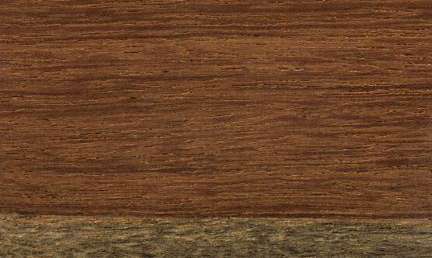
Sucupira preta (Diplotropis martiusii)
Family: Leguminosae
Common names: Alcornoque , Arenillo, Baaka, Chintaquiro, Chontaquiero, Coeur dehors, Congria, Huasai-caspi, Kiabici, Sapupira, Sapupira da varzea, Sapupira do igapo, Sapupira preta, Sucupira, Sucupira preta, Tatabu, Zapan negro, Zwarte kabbes
Distributed in: Brazil, Columbia, French Guiana, Guyana, Peru, Suriname, Venezuela (Central America, Latin America)
Distribution overview: Tropical South America, in Brazil, Colombia, Guyana, French Guiana, Peru, Surinam, and Venezuela.
Common uses: Boat building (general), Brush backs & handles, Fine furniture, Flooring, Furniture, Interior trim, Joinery, Light construction, Railroad ties, Stairworks, Tool handles, Turnery
Product sources: The ITTO reports that the species is a fairly important source for timber production, and that the material is exported on a regular but limited basis.
Environment profile: Status unknown due to inadequate information
Tree size: Trunk diameter is 100-150 cm
Colors: the heart isRed, Reddish brownand the sapwoodClearly differentiated from the heartwood, White to yellow.The grain isInterlocked, the textureMedium
Natural durability: Susceptible to insect attack, Very durable
Odor: No specific smell or taste
Kiln Drying Rate: Naturally dries slowly
Drying Defects: Slight tendency to distort and check, Splitting
Ease of Drying: Slowly
Comments: General finishing qualities are rated as good
Blunting Effect: Moderate
Cutting Resistance: Moderate to saw
Gluing: Fairly Easy to Very Easy
Nailing: Pre-boring recommended, Very Good to Excellent
Planing: Difficult to plane
Sucupira is hard and typically contains interlocked grain, factors which are reported to combine to make it a rather difficult wood to plane and work in most woodworking operations
Resistance to Impregnation: Resistant sapwood
Response to hand tools: Fairly Difficult to Difficult to Work
Veneering qualities: Suitable for slicing into decorative veneers
Steam bending: Fair to Good Results
Screwing: Fairly Easy to Very Easy, Very Good to Excellent Results;
Polishing: Very Good to Excellent; Staining: Fair to Good;
- Numerical data Metric
- Numerical data English
- Strength properties
- References
 |
 |
 |
 |
| Item |
Green |
Dry |
Metric |
| Specific Gravity |
|
|
|
| Density |
|
865 |
kg/m3 |
| Bending Strength |
|
|
kg/cm2 |
| Crushing Strength |
|
|
kg/cm2 |
| Hardness |
|
|
kg |
| Impact Strength |
|
|
cm |
| Shearing Strength |
|
|
kg/cm2 |
| Stiffness |
|
|
1000 kg/cm2 |
| Tangential Shrinkage |
|
|
% |
| Radial Shrinkage |
5 |
|
% |
| Weight |
977 |
801 |
kg/m3 |
| Maximum Load |
|
|
cm-kg/cm3 |
| Toughness |
|
|
cm-kg |
| Static Bending |
|
|
kg/cm2 |
|
 |  |  |  | | Item | Green | Dry | English | | Density | | 54 | lbs/ft3 | | Weight | 61 | 50 | lbs/ft3 | | Radial Shrinkage | 5 | | % | | Tangential Shrinkage | 7 | | % | |
Density (dry weight) = 67-75 lbs/cu.ft
Density (dry weight) = 61-67 lbs/cu. ft
Density (dry weight) = 53-60 lbs/cu. ft
Chichignoud, M., G. Deon, P. Detienne, B. Parant, and P. Vantomme. 1990. Tropical Timber Atlas of Latin America. Prepared for International Tropical Timber Organization (ITTO) by Centre Technique Forestier Tropical (CTFT, Division of CIRAD, 45bis, Avenue de la Belle Gabrielle, Nogent-sur-Marne Cedex, France.Erfurth, T., Rusche, H.,1976,The Marketing of Tropical Wood B. Wood Species from S. American Tropical,Moist Forests,F.A.O. Forestry DepartmentHighley, T.L., Scheffer, T.C.,1970,Natural Decay Resistance of 30 Peruvian Woods,U.S.A. Agriculture Department, Forest Service, Forest Products Laboratory,,Madison Research Paper,No.143Loureiro, A.A., Freitas da Silva, M.,1968,Catalogo das Madeiras da Amazonia (2 vols,Min. do Ultramar Belem Brasil
|








